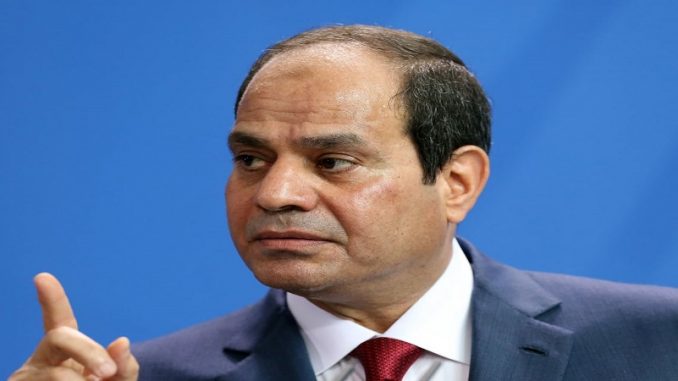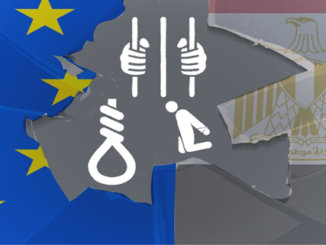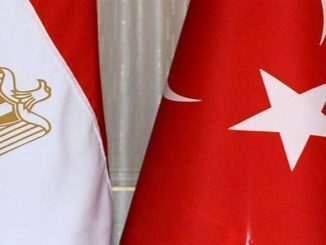
Sisi crushes spirit of Arab Spring in Egypt: Activists ‘opened the gates of hell’
Just two years ago, Abdel-Fattah al-Sisi celebrated the Egyptian masses who launched the 2011 uprising that toppled longtime ruler Hosni Mubarak, saying the popular protests had revived “noble principles” and founded a “new Egypt”, a report by Jacob Wirtschafter on the Washington Times said. ‘But this month, the leader of the largest Arab nation made it clear once again that he would no longer even pay lip service to the Arab Spring and its promise of democracy and the right to challenge the government,’ the report added.
The young activists behind the 2011 revolt had good intentions but “opened the gates of hell,” he said at the World Youth Forum in Sharm el-Sheikh in Sinai. “Haphazard change results in a vacuum, which only evil people will move to fill.”
Most observers of Egypt are not surprised at such sentiments. Although much of the region is transfixed by the drama over the apparent killing of dissident Saudi journalist Jamal Khashoggi, Egyptian activists and international rights groups say the al-Sisi government has engaged in a protracted, systematic campaign to consolidate power and shut down any voices criticizing the one-time army chief turned president.
Since Mr. al-Sisi took over in 2014 with the ouster of Islamist-leaning elected President Mohammed Morsi, there has been a slow erosion of civil rights, in many ways surpassing the old repressive practices, critics say. Under Mr. Mubarak, the country’s press was allowed considerable latitude in discussion of domestic and foreign policy issues, and demonstrations by student, labor and professional interest groups were usually tolerated.
But because of an uptick in terrorism since the Arab Spring blamed on secularists, the political opposition and Islamist groups, as well as popular dissatisfaction with the government’s uneven economic reform program, the Egyptian leadership has pursued a general crackdown on civil society that has accelerated slowly over the past year.
“We protested Morsi because we thought we didn’t want to replace one dictatorship with another,” said Khaled Dawoud, a former spokesman of the liberal Al-Dostour Party. The party supported the 2011 revolution against Mr. Mubarak and the June 2013 street protests that led to the ouster of Mr. Morsi, who had close links to the Egyptian branch of the Muslim Brotherhood.
Now, Mr. Dawoud said, he believes Sisi, who was re-elected in March for an additional four years in office, has installed “the worst authoritarian state with single-man rule and a parliament that is basically a rubber stamp for all the decrees that he issues.”
“More and more people are getting arrested, and it has become clear that the state basically doesn’t want public protests anymore,” Mr. Dawoud said.
International monitoring groups such as Amnesty International point to the Nov. 1 arrests of at least 19 lawyers and activists, which included 60-year-old human rights lawyer Hoda Abdel-Monaim, a former member of the National Council for Human Rights, as the latest sign of severe deterioration of individual liberty and freedom of expression in Egypt.
“The chilling wave of arrests targeting the human rights community is yet another appalling setback for human rights in Egypt,” said Najia Bounaim, Amnesty’s Middle East and North Africa campaigns director in London. “With these arrests, the Egyptian authorities have once more demonstrated their ruthless determination to crush all activism and dismantle the human rights movement in the country.”
Rights groups say Egypt’s government has jailed tens of thousands of people, including several prominent activists behind the Arab Spring protests, since the military took power in 2013. Many of those detained have been held for months or even years without trial.
Broader crackdown
This year’s arrests have not been limited to radical youths or politicians and lawyers with ties to the Muslim Brotherhood.
Masoum Marzouk, a former Egyptian diplomat and a veteran of the 1973 war against Israel, was jailed in August for calling for a referendum on Sisi’s government. Economist Abdel Khalek Farouk and his publisher Ibrahim al-Khatib were jailed for two weeks last month simply for publishing a book questioning the government’s economic reform agenda.
Mr. Farouk’s book “Is Egypt Really a Poor Country?” examined the relationship between employment and population density in the country and questioned how the government was able to finance the $45 billion construction costs of the new administrative capital. He also addressed questions about suspected official corruption.
At the same time, public anger has been growing over a three-year International Monetary Fund bailout, which is causing hardship for debt-saddled Egypt. The annual urban consumer price inflation rate reached 17.7 percent in October, according to the government’s statistics agency.
A poll by public opinion firm Dalia Research found that 45 percent of Egyptians believe the level of corruption has increased over the past year. At the same time, 65 percent of the respondents say the gap between the rich and poor has widened in Egypt over the past 12 months.
“There is no sense in the government’s economic program, and they are prioritizing the wrong things — first with the Suez Canal enlargement and then the new capital,” said Hala Foda, secretary for human rights and freedoms for the Egyptian Social Democratic Party. “Limiting criticism of this is a big part of what’s behind the restrictions on the press, which even includes what people post on social media.”
Meanwhile, Sisi’s government has issued regulations aimed at intimidating the country’s last remaining independent media. The law, which the authorities began implementing in October, requires online newspapers to register with the government and requires news-oriented websites to post a bond of $30,000 to operate.
Egypt has blocked hundreds of websites, including those of several independent media outlets, while all major media outlets in Egypt support the government.
Sisi, who has cultivated close ties with Riyadh, said international media coverage played a “negative role” in the case of Mr. Khashoggi, who was apparently killed in the Saudi Consulate by a government hit team in Istanbul last month. Egypt supports Saudi Arabia on the issue, which has created an international uproar and threats of sanctions by the West.
“We need to stop and wait for the relevant authorities and judicial bodies in Saudi Arabia to announce the outcome of the investigations,” said Sisi, who said he defended Saudi Arabia because he wants to protect the stability of all nations in “a region that cannot bear any more turmoil.”



